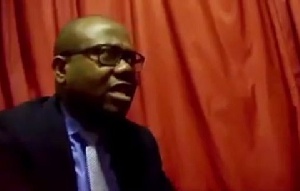Ghana’s football association (GFA) has admitted knowledge of ‘external influences seeking to manipulate matches’ in the country’s various competitions.
The association was replying to the much anticipated, public screening of a documentary that promised to expose officials including referees and top executives demanding kickbacks and taking bribes.
GFA however says it is working with global football governing body, FIFA to implement a national integrity initiative that will fight the vice of match manipulation. The association says it was alerted about the possibility of matchfixing in Ghana eight months ago.
Revelations from the documentary
The two-hour documentary, “*When Greed and Corruption Become the Norm*”, is the work of undercover journalist Anas Aremeyaw Anas and Wednesday’s public viewing was the first since it was released to the authorities last month.
The Ghana Football Association however says it was not given an opportunity to watch the documentary and request the Tiger Eye PI team that produced it to furnish them with recorded material from the documentary.
Association president implicated
In the documentary, Kwesi Nyantakyi, the FA boss and a member of the FIFA Council, was seen in a hotel room taking a $65,000 bribe from a supposed businessman seeking to sponsor the Ghanaian football league for up to $15 million over three years.
The video also showed Nyantakyi offering to facilitate the award of key government contracts to the businessman on conditions that he paid kickbacks totaling $12 million through him to top officials including President Nana Akufo-Addo.
Specifically, Nyantakyi requested $5 million for Akufo-Addo, $3 million for Vice President Mahamudu Bawumia, $2 million for the roads minister, $1 million for a deputy roads minister and another $1 million for him and one of his aides.
Akufo-Addo, who watched the video last month, denied any knowledge of Nyantakyi’s claims and has instigated a criminal investigation against the administrator for fraudulently using the President’s name.
The football association issued a statement last month backing their president and saying he was innocent until proven guilty.
In different segments, other soccer officials such as referees were shown accepting bribes ranging from goats to cash sums of 300 to 4,000 cedis ($64-$858) to make favourable decisions.
Ghanaians in shock
The scenes in the documentary shown in the 6,000-capacity auditorium of the Accra International Conference Centre drew intermittent uproar from the crowd, which included business leaders, the clergy, civil society leaders, diplomats and sport administrators.
The heavily guarded auditorium was draped in national colours and before the screening, the crowd, presided over by a Catholic priest, sang the national anthem.
“I am yet to recover from the shock. It’s a sad day for Ghana football and I believe there’s an urgent need to clean up our football administration,” 42-year old soccer enthusiast Michael Blagogee told Reuters as he exited the auditorium holding his head.
GFA pledged to conduct a thorough review of its operations in order to deal with the alleged acts of corruption in the game. The same statement also said the GFA would not attempt to ‘cover up’ or ‘shield’ any of its members caught up in acts of corruption.
Football is by far the most popular sport in Ghana and while the national team, the Black Stars, failed to reach this year’s World Cup finals, they were quarter-finalists in South Africa in 2010.
General News of Thursday, 7 June 2018
Source: africanews.com

















